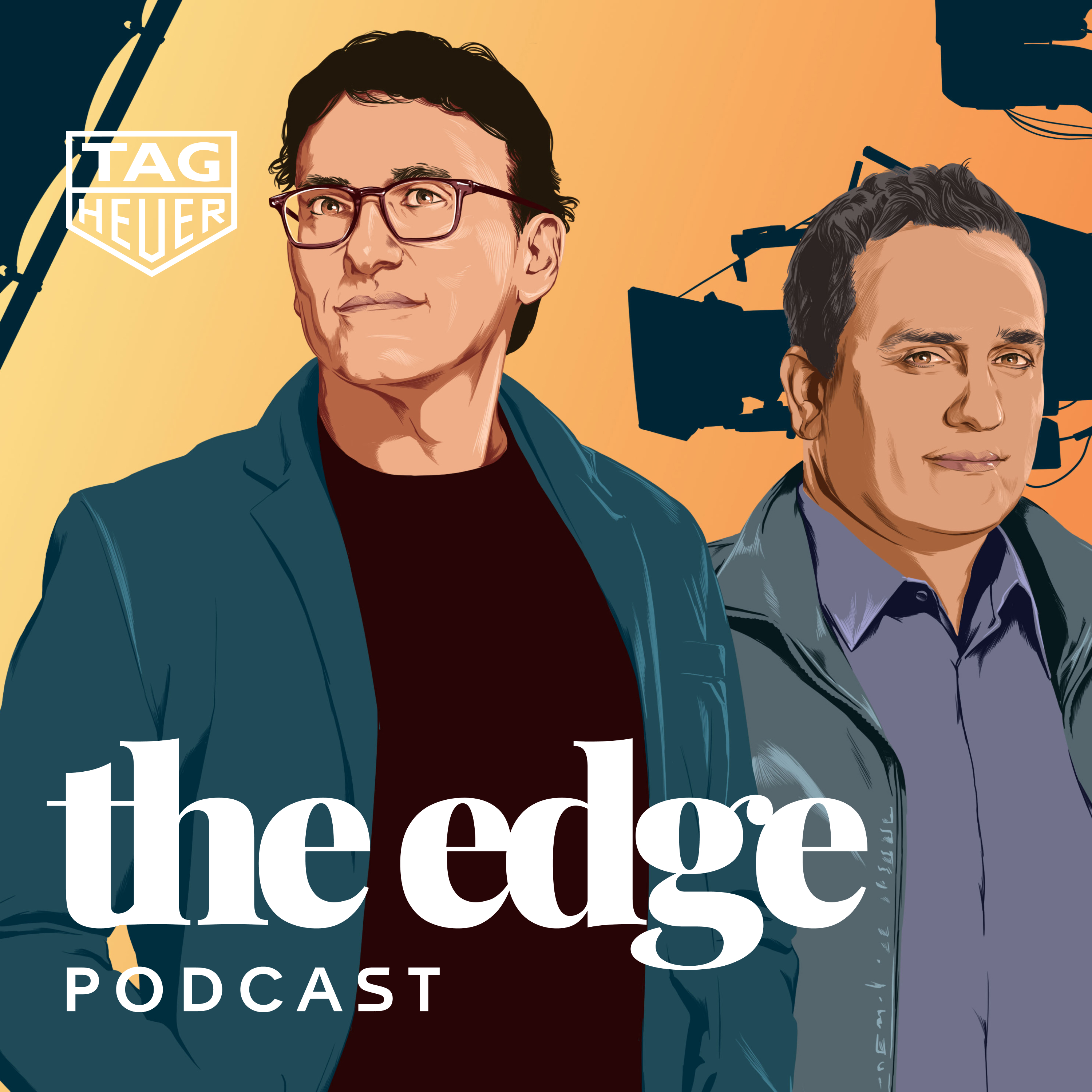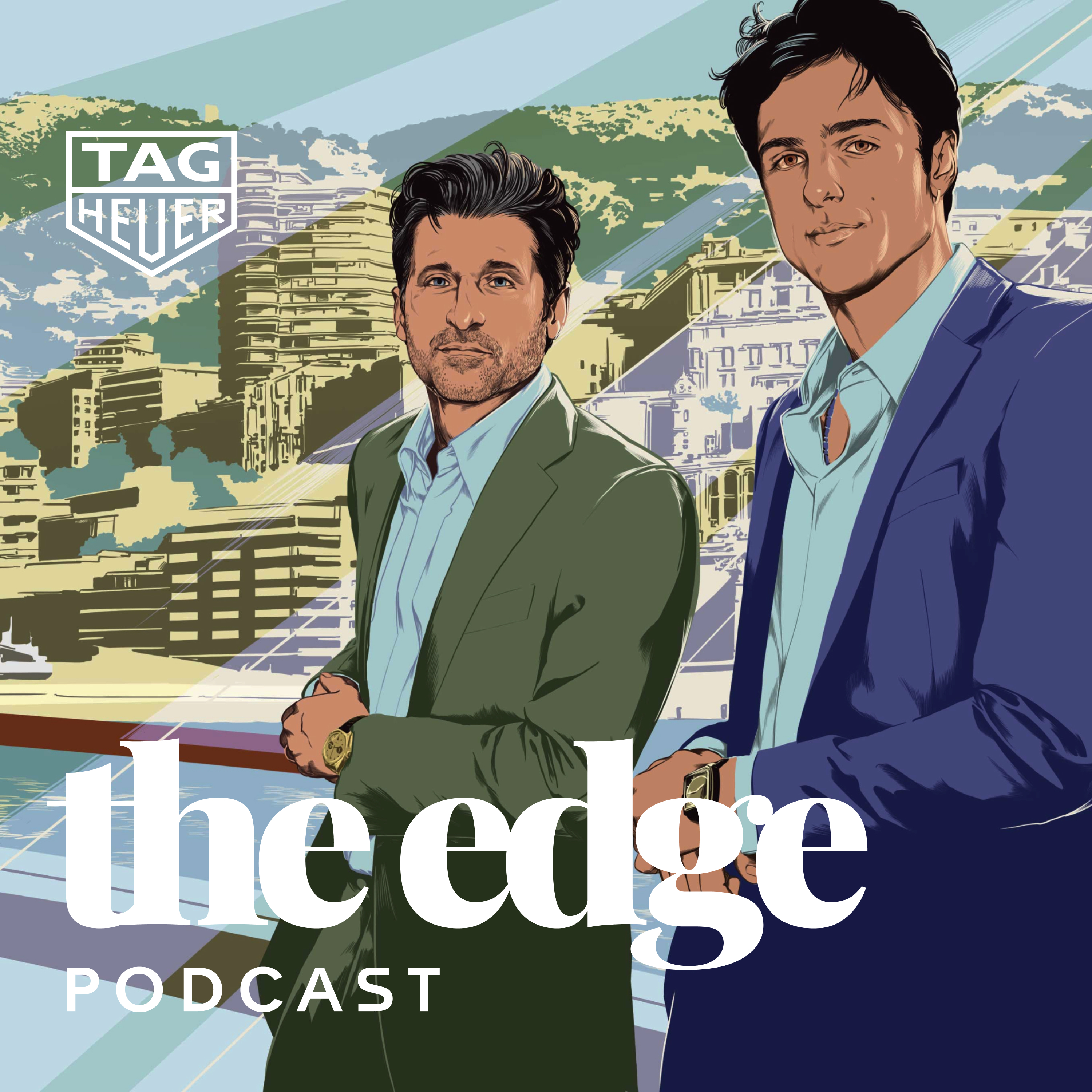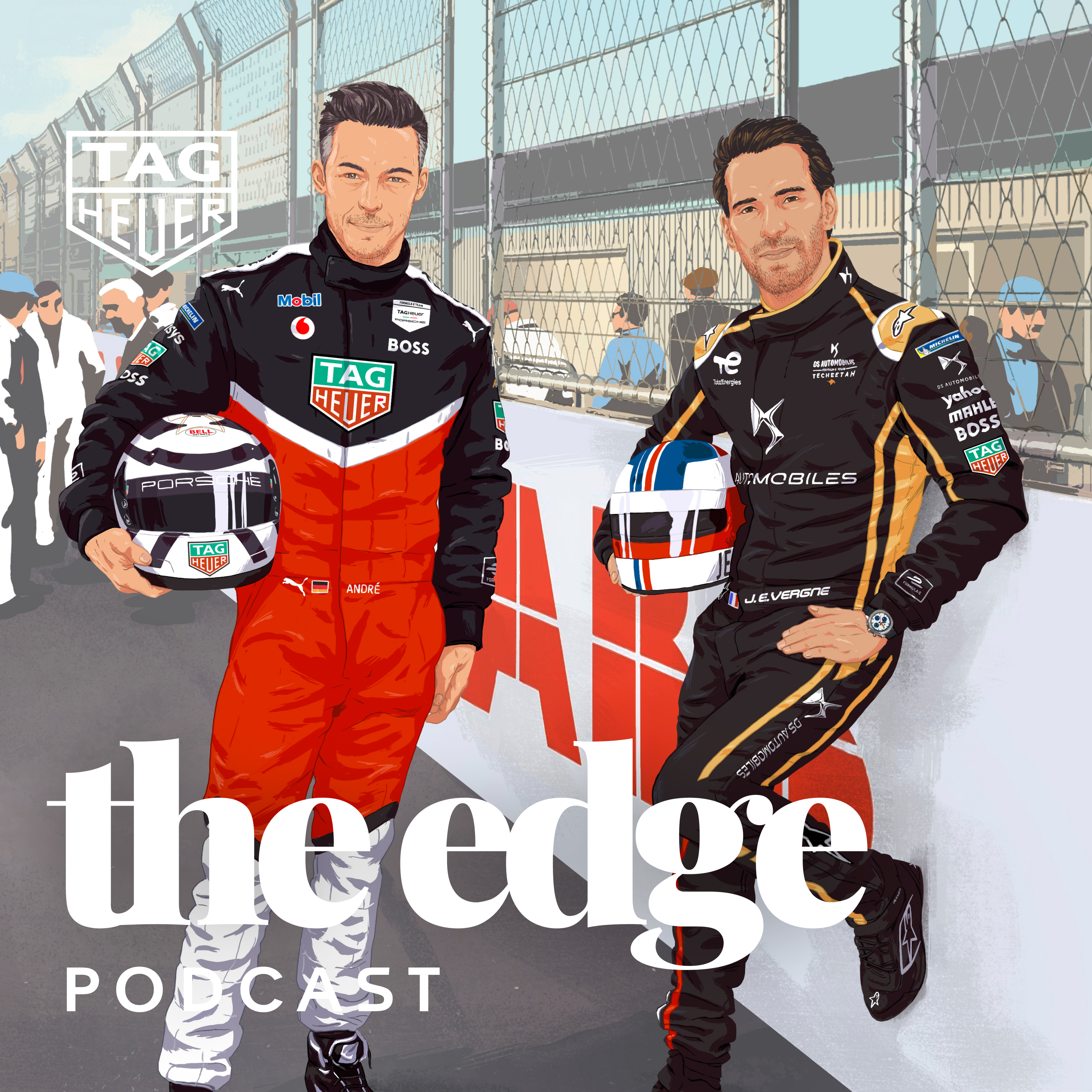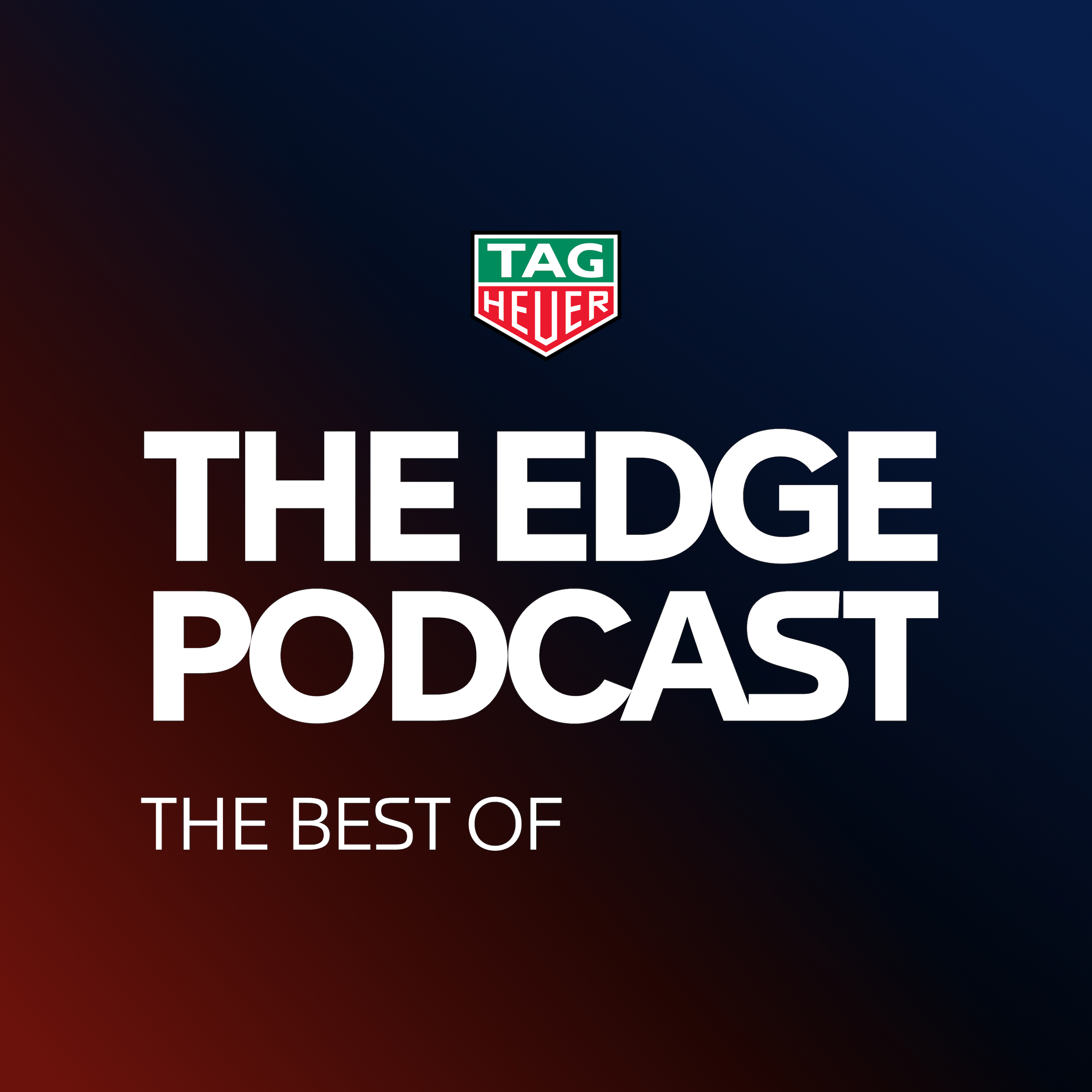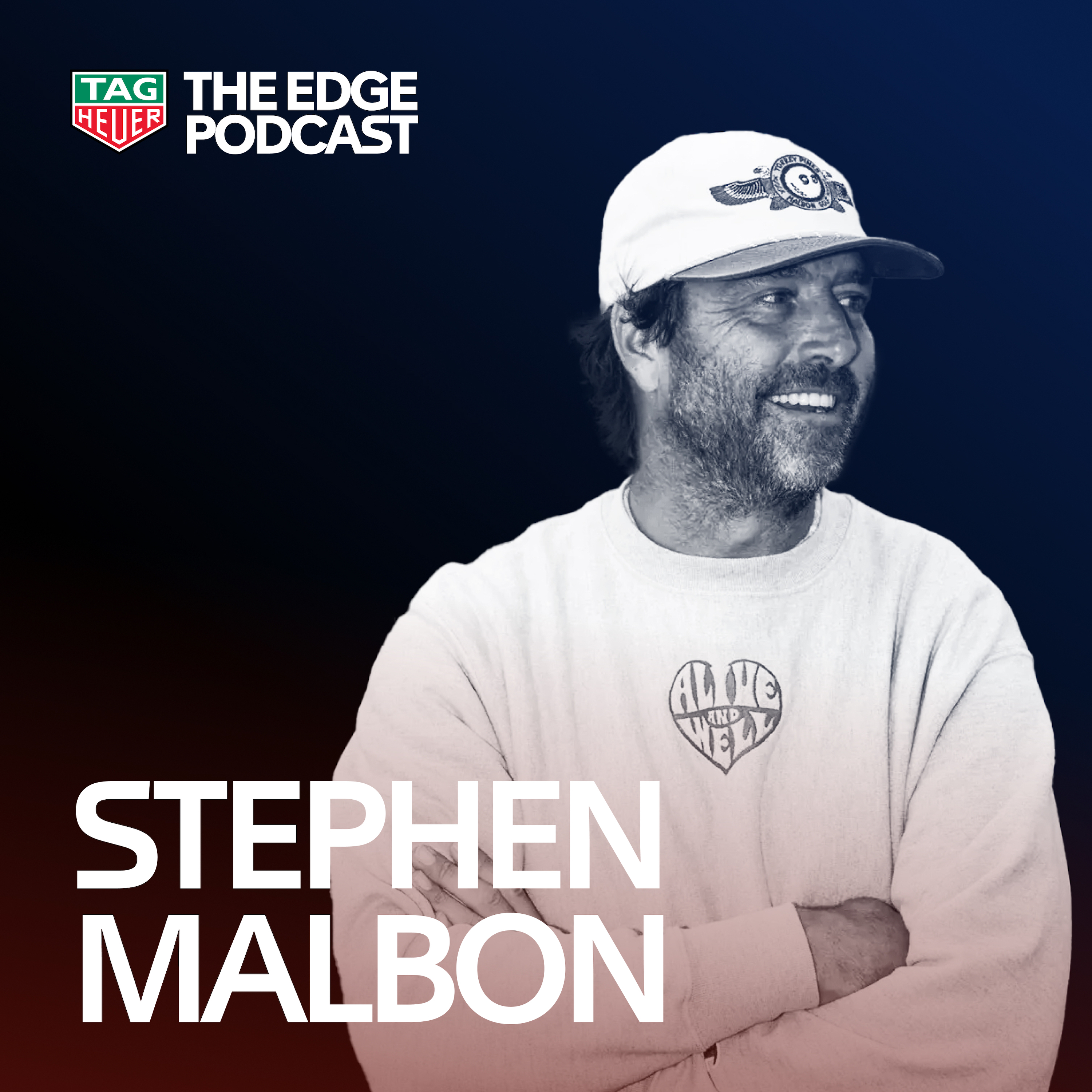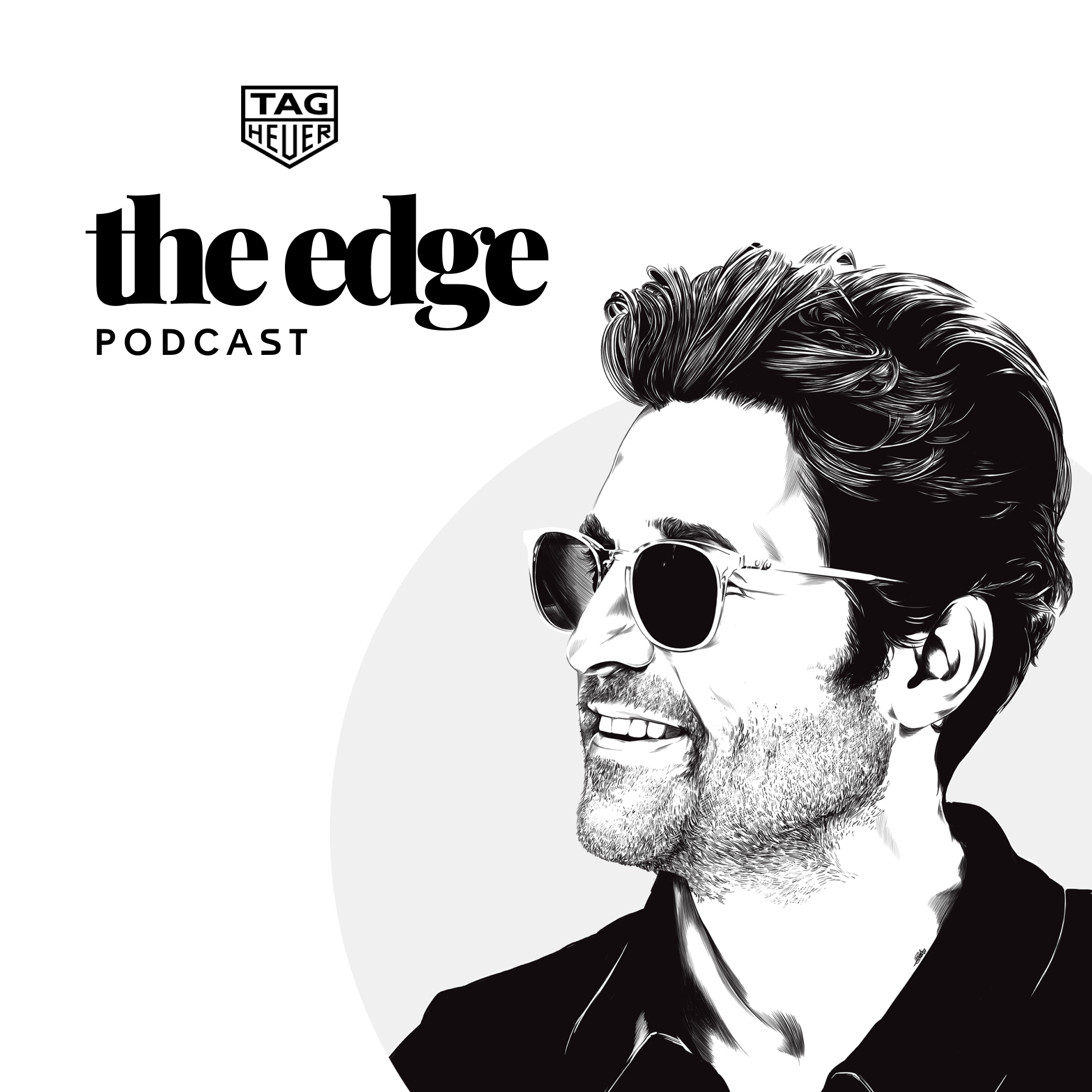Episode Transcript
Speaker 1 00:00:01 You know, that, feeling, that feeling when you discover the perfect teammate, that feeling when you just balance each other out that feeling when you create great things together. Well, that's the feeling I got when I interviewed sibling filmmakers Anni and Joe Russo, AKA the Russo brothers, born into an Italian American family in Cleveland. They share their journey from making art house films to blockbusters like the gray man, their new Netflix movie, starring Ryan Goling. So get the popcorn ready and listen to the moments that made the Russo brothers. One of Hollywood's hottest, double acts I'm Teo. Welcome to the edge, a podcast by TAG Heuer. I started the interview by asking them about the early years, how they started working together, their dynamic and their creative process. Here's Joe,
Speaker 2 00:00:56 I think it was in our early twenties. You know, we're both pursuing, uh, other careers at the time, an, uh, legal career. And I was looking at acting. We had a love of movies since we were kids and, you know, made a decision at a point, I think in the early nineties, when Sundance was, um, fueling dreams of young filmmakers that they could, uh, you know, make a movie for nothing regionally, uh, get into Sundance and get discovered to be the next big thing in Hollywood. And we decided to make a film. Unfortunately, our taste was a little bit more, um, extreme and radical than the type of movies that were, um, exploding out of Sundance. Uh, we're fortunate enough that, uh, you know, we got discovered by Steven Soderberg and that's really how our career began. He transitioned over time from, you know, making art house fair, into more commercial fair under the tutelage of Steven who had a similar trajectory, uh, in his career.
Speaker 3 00:02:01 There's generally two reactions to, uh, the fact that we work together. One is, oh, I wish I could work with my sibling like that, or, oh my God, I could never work with my sibling like that. It tends to be one or the other. Um, we don't have a very studied process. We basically have a nonstop dialogue between us. It, it, it's just, uh, it's the way we started, you know, we, we learned how to make movies together. We came up in Cleveland, uh, where we grew up and there's N you know, this is pre-digital, there wasn't, uh, much of a filmmaking community there. So when Joe and I began thinking about filmmaking, we were reading a lot of books and talking to one another about those books. And we weren't studying film formally at the time. Uh, we were starting to play around with equipment, finding the few people in town that, that had knowledge about film equipment. And again, this was stuff that he and I were figuring out together. So we developed this process of just approaching filmmaking in a type of partnership where we were feeding off of one another and learning together and growing together, and then figuring out how to express ourselves together. And it just became a, a natural process. We, we come from a large Italian American family. We're very used to, um, sort of having strong, close relationships with our family members. Our relationship just kind of grew from there. And our, our process is very informal.
Speaker 1 00:03:26 We should talk about the gray man. You've kind of created this film, fantastic film at a very established point in both your careers, your shared career. Um, how did it come about?
Speaker 2 00:03:37 So while we were shooting, um, we were approached with a book and I did an adaptation of this book that I thought was really spectacular read. It was really dynamic. It was, you know, an incredible sort of exercise in action, um, from start to finish, had really inventive set pieces. And, uh, you know, once, once we took on civil war and then the two Avengers movies, obviously we had to put this aside and then came back to it, um, after, uh, uh, we were done with those films and started ABO our own company. And, um, uh, you know, we got the rights out of Sony and, uh, and set the film up, uh, um,
Speaker 1 00:04:14 At Netflix. Fantastic. So an Anthony, Joe, I mean, there are a couple of really extraordinary moments in the film. The scene in Prague is one of my favorites and the scene in the plane yeah. Is absolutely fantastic. There are loads of extraordinary scenes in this film. What was your favorite moment during filming and which was your favorite scene? Two film?
Speaker 3 00:04:34 Wow. Well, I mean, look, they're all thrilling and challenging. I mean, every, the movie was intended to be sort of a, a, an adrenaline rush and, and a, a gauntlet of action, uh, that this lead character is put through. They were all challenging. They were all exciting. Certainly the scene in Prague was very difficult to shoot. It was a massive set piece that involved huge sections of the city involved, a, a big, main square in the city. It involved a tram creaming through town with car chase. It was very complicated. So that scene, I mean, our whole team basically had to draw upon all of our experience and, and reach beyond what we'd ever done before in order to figure out how to achieve that scene. So I think in a lot of ways that was the most challenging scene, but maybe also the most satisfying because of that level of challenge.
Speaker 1 00:05:23 I'm really intrigued, uh, how, you know, you were talking about going from art house films to these more commercial pieces, like directing an action film. Like this feels like it's a real act of production, and it's an act of kind of figuring out where the moving parts are gonna be and how to bring them together. Is it a very different skill set? Would you say, and has it been kind of easy to master? Was it a, an easy transition or did you find it quite challenging?
Speaker 2 00:05:49 Comedy in action are very similar. I mean, we spent a long time doing comedy, so it's all about geography. It's all about spa awareness. It's all about where things go in. The frame comedy is you have to prep it, you have to prep a physical gag in comedy. You have to prep a physical gag in an action film, you know, and, uh, and that requires a level of precision and safety and stunt teams. And so sort of a natural progression for us through our careers to, um, to go from, you know, shows like rest development and community into, you know, uh, winner soldier, gray man. And in fact, you know, these were some of our favorite movies growing up were action, thrillers. We like genre quite a bit. We like that you can infuse genre with interesting thematics and make a propulsive and watchable. And at the same time, give people some, you know, some head food, uh, if they're looking for it,
Speaker 2 00:06:44 I mean, I've, I've said this in the past, that movie almost killed us. I mean, it's nine set pieces and set pieces require, you know, long, very long days. They're, they're strenuous. Uh, they're very physical. Uh, you know, you have to be very careful with safety issues. Uh, and, um, uh, you know, and I edit at night when we're shooting action, we go into the edit room, we look at cuts and we assess the work that we've done, and we're always chasing storytelling and we're always chasing how do we improve it? Uh, and so, you know, doing nine set pieces, you're doing that over and over and over again, endlessly for six months, um, you're really sleeping, you know, four or five hours a night. It's exhaustive, it's mentally taxing, emotionally taxing. So, uh, this was a very, very difficult movie to make in a lot of ways because the movie is wall wall action.
Speaker 2 00:07:35 The exercise is to make people forget that they have popcorn in their lap and they don't eat it by the time the end of the movie shows up. They're like, oh my God, I was so engrossed in what was happening that, uh, I forgot to, uh, to eat my buttered popcorn. So that's really the, uh, approach on this film. It's, you know, how, how far can we push it? How relentless can we make it? Uh, it's a ticking clock movie, uh, and it's two very extreme characters, um, uh, you know, in a parable of, of good evil,
Speaker 1 00:08:05 How do you maintain kind of good morale on a set like that, where it is so high pressure, and there's so much kind of going on, and if you're having to do these early starts and you were all together, I imagine in a very, it's like a kind of, what's it called pressure cooker? How do you manage that?
Speaker 3 00:08:22 Well, we're very fortunate. We've gotten to the place in our careers where everybody on our team is the best at what they do, right? So they don't, they require very little external motivation to deliver, uh, really inspired top level work. So, uh, our job is basically just to make sure everybody's feeling good and is well supported, you know, so we, uh, we try to create a very casual atmosphere on set. I mean, everybody is focused and the, the work is serious and sometimes even dangerous with action. So there's always a level of focus, but, uh, we try to keep things very relaxed and we try to have fun in between takes, you know, it's, it's complicated, the movies, movie's hard, it's physically hard. It's physically hard on the actors and the crew. And sometimes the material in the film is gets pretty dark intense as well. The stakes are very high in the movie. So we try to between takes, we try to make sure people are laughing and people are sort of having a good time, and there's a way to engage in life beyond what we're all sort of doing in that given moment, so that people maintain a nice, healthy balance and stay in a good space. It's really important. That's the energy Joe and I like to have around us.
Speaker 1 00:09:36 I've intrigued to something like this, where you again, have so many elements coming together. And so many people working on it. At what point do you know that you're finished? Like when, when is that line? Because there must be so much you can do in tinker
Speaker 2 00:09:48 Usually when they take movie out of our hands. Yeah. And they're like, this has to go into a theater. This has to get, uh, shown. You're always working on it until the last minute, you know, everyone involved, our perfectionist, we're all used to working at the highest level. And, you know, you're, frankly we're constantly pushing deadlines. We're constantly being called and said, can we please please just get the movie or it's not gonna be ready. So you're always, um, there's always something that can be made better.
Speaker 1 00:10:14 Do you feel proud of the film and if so, is there a specific part of which you feel proudest?
Speaker 2 00:10:20 I love this film. I think it's one of my favorite that we've made. Uh, and I love the tone of the movie. I love that it, um, you know, and I love to experiment with tone and we find that tone is probably the most interesting aspect of just about any film and that when a movie really, really succeeds it's because of tone. And when it fails, it's because of tone. And what, you know, we like to do is, is combine different tones, uh, in ways like a mad, like mad scientists and a laboratory mixing together, beakers, um, you know, we like to play with tone in a way that, you know, gives you something that feels a little fresh or a little different. This movie has, uh, you know, some familiar genre elements to it without question, but it also has a very quirky sense of humor to it. Uh, it's very, you know, there's some very twisted thematics at the heart of the film. It's both extremely violent at moments and then very heartfelt. And then, you know, it moves through a lot of different, uh, emotions and phases. Uh, and hopefully that gives the audience a more rewarding experience of the film.
Speaker 1 00:11:21 You go in thinking it's gonna be an action film, and you have a very clear idea of what an action film is. And then you are, I found myself surprised kind of quite consistently at certain points. And you're like, okay, that's subverts what I expected it to be, which is I imagine success in your eyes, which is a great thing.
Speaker 2 00:11:37 Absolutely.
Speaker 3 00:11:38 Yeah. That's amazing to hear from you. Yeah.
Speaker 1 00:11:47 I'm intrigued to know in terms of the actors. I mean, again, you've got a lot of big people on that set, like a lot of big names. Um, were, did you feel any specific pressure with any of them and how do you negotiate that? Generally,
Speaker 3 00:12:00 We feel very fortunate to have been able to assemble the, the cast we did on this movie. It is unbelievable. Um, and, uh, but Joe and I are very actor orientated. We love actors. A lot of our process involves, uh, sort of talking with actors about their roles, their approach to the film, uh, sort of really pulling out of them ideas that they have about their characters, figuring out what we can use from that in, in order to give them a more, uh, personal, emotional investment in the character and sort of how to make the movie stronger and more dimensional, push things in directions. Maybe we hadn't been thinking of. Um, so we, we really love the process of working with actors, you know, after having made Avengers, uh, infinity war and end game, I don't think there's any size cast that's like, uh, ever gonna be too intimidating for us to handle, uh, once we dealt with that, the size of that cast. But, um, and also everybody's an immense professional. I think we all feel very lucky to have the opportunity to make a movie like this. And for many of the cast members, they've never made a movie like this before.
Speaker 1 00:13:08 And do you feel like, obviously you've got two very, very big names in there specifically in Chris Evans and Ryan Gosling, but do you feel like a, a desire and a responsibility to bring in new names to kind of give them a platform with what you do
Speaker 2 00:13:21 Without question? I mean, that's a huge part of it is when and where can you, you know, um, encourage diversity, where, and when can you bring in, you know, new talent, fresh talent that people haven't seen before, give them an opportunity. I mean, we were given that opportunity, uh, uh, by Steven Soderberg.
Speaker 3 00:13:37 I think one, one example of that in the gray man that we're very proud of is, you know, there is in, in a really accomplished actor named Duch, who is a big star in India, but not really known outside of India. And, uh, we're able to bring him to global audiences through this movie in a really special role, uh, and a, an incredible performance that he gave.
Speaker 1 00:14:02 It's a really interesting one. I mean, do you feel, I guess often when you've watched these kind of big action films before you felt that there is a very kind of Western centric kind of, um, viewpoint, right? Because by nature of where they're made and who they're made by, um, but they are global. I mean, they're probably the most global product, um, that exists today in terms of the reach that they have. I mean, you've kind of said it, but do you feel the, the weight of that responsibility or do you try and kind of, how do you navigate that?
Speaker 3 00:14:30 We look at it as an amazing creative opportunity, you know, that that's really how we frame it, Joe and I, like, we grew up watching a lot of global cinema. We, we grew up near the Cleveland cinema tech and it has an amazing program of art, cinema and global cinema. So from a young age, we were very interested in where cinema can take you far beyond your ex uh, your sort of local experience. And that's something that we've fed off of through our whole careers is as we were taking those movies around the world, there's audiences for those movies in every corner of the globe, and to be able to engage with those audiences and then start to engage with filmmakers in those all over the world, that was an amazing, exciting, creative process for us. And so that's the real opportunity that Joe and I look for in these movies is what can we do when our palette is the entire world, rather than a more traditional narrow Hollywood palette. And that's exciting for us. And I, I do think there are other, um, sort of benefits of it, of course, you know, giving people, voices and platforms that they haven't had before is critically important. But I think the heart of it for us is, is creative opportunity.
Speaker 2 00:15:49 What excites us. I mean, we tend to try to do things that are different from what we've done before. We did experiment with different tones on each of the films and slightly different genres, but, you know, we're, we get restless quickly. You know, I think we have high functioning ADHD, and, you know, once we've done, uh, um, you know, one, one type of project, we don't tend to want to repeat it immediately on the next one. Another thing Soderberg taught us early on in our careers was just not, you know, not to allow people to define us. He said, that's death. You know, you allow the press, which, you know, is, according to him was inherently lazy and wanted to encapsulate who you were in five words, uh, and move on to the next. He's like, don't let them, uh, encapsulate you in five words. Don't let them define you in those five words. Uh, and, uh, and so our, our careers have been, uh, um, a test of that, uh, thesis,
Speaker 2 00:16:44 Uh, uh, if there anything that, uh, at the start of our careers that I wish I'd known that I know now, I mean, there's this famous, um, story where a young filmmaker had asked Steven Spielberg, uh, you know, they said, Steven, I just got my first big movie. Can you gimme any advice? And he said, yeah, I get a physical trainer, you know, um, cuz it's gonna beat you up. Uh, and uh, you know, the physical toll that it takes on you is dramatic. So I guess, uh, I would've, I would've eaten less pizza along the way.
Speaker 1 00:17:13 <laugh> you?
Speaker 3 00:17:15 I mean the physical endurance is a, is a strong one for sure. Um, I sort of feel like my entire career. I just, I, I really love the process of discovery that's inherent in this kind of work. And I like the fact that, um, each movie is an opportunity to take us somewhere. We haven't gone before psychologically or philosophically, intellectually, or even physically
Speaker 1 00:17:48 The Russo brothers. Thank you so much, uh, for taking the time to talk to us about the gray man, your new project, very excited. Everyone should watch it. Uh, thank you for joining me at the edge. Thank you so much. It's been a pleasure to have you thank you for listening to this episode of the edge. Let us know what you thought in the comments, wherever you get your podcasts. And if you've enjoyed it, don't forget to subscribe and leave us five stars. It does make a difference. Thank you so much to the Russo brothers for joining me. I'm your host Teo, and I'll be back next month with another episode of The Edge, a podcast by TAG Heuer. See you soon.
